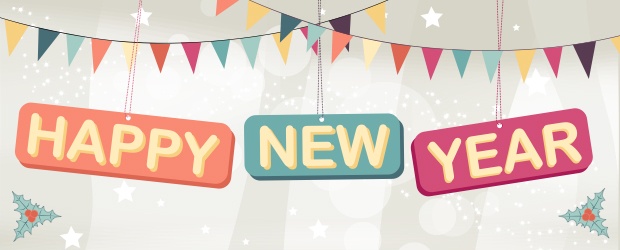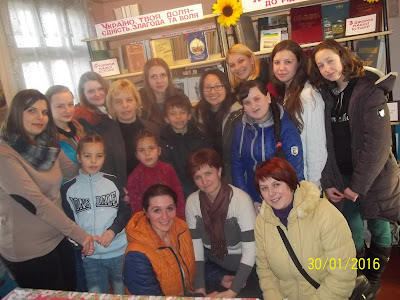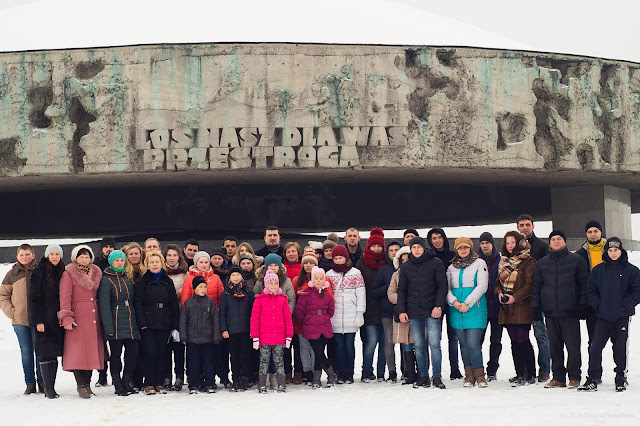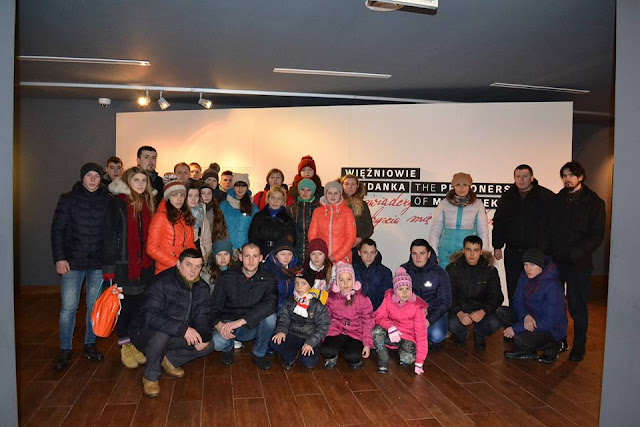30 січня 2016 року мала можливість спробувати себе у ролі перекладача. Ми разом із Світланою Колядою (бібліотекар с. Забужжя) та Джейн Лі (волонтером Корпусу Миру) відвідали філію бібліотеки №53 у с.Зубків, де нас чекали місцеві читачі. Зустріч вийшла дуже теплою та приємною. Серед відвідувачів бібліотеки було багато моїх колишніх учнів. Згадали все, що колись разом вчили у школі, пробували говорити англійською. Приємно, що багато дітей розмовляли іноземною самостійно, а решта пробували порозумітися з незначною допомогою. Щиро вдячна господині бібліотеки Наталії Ярмошик, яка багато років була моєю колегою по роботі та всім присутнім. Було гарно!
неділю, 31 січня 2016 р.
четвер, 28 січня 2016 р.
Мандруємо Польщею
 24 січня 2016 року ми продовжили відкривати Польщу разом з нашим творчим колективом. Після казкового відпочинку у хуторі "Гораєц" ми вирушили у цікаву мандрівку в м. Люблін. По дорозі нас чекала зворушлива екскурсія у концтаборі "Майданек" подорож старовинними вулицями міста, яке чимось нам нагадувало Львів.
24 січня 2016 року ми продовжили відкривати Польщу разом з нашим творчим колективом. Після казкового відпочинку у хуторі "Гораєц" ми вирушили у цікаву мандрівку в м. Люблін. По дорозі нас чекала зворушлива екскурсія у концтаборі "Майданек" подорож старовинними вулицями міста, яке чимось нам нагадувало Львів. середу, 27 січня 2016 р.
Концерт у Польщі

Напевно, нічого в житті не відбувається без Божої на то волі, допомоги друзів та небайдужих людей. Може це і смішно, але ми йшли до цього рік маленькими кроками. Ніби і недалеко їхали, але кордон- велика перешкода для нас через стоси різноманітних документів і витрати, які вони тягнуть за собою. Щиро дякую всім, хто допоміг порадою, ділом, фінансами, хто вірив у нас. Велике спасибі Марціну Рехулічу, агенції розвитку Розточчя та товариству «Чайня» за проукраїнські погляди та щиру симпатію до українців, за сміливість показати своїм співвітчизникам те, на що у них може бути непередбачувана реакція, а також за можливість стати людям по обидві сторони кордону трохи ближчими один до одного, обмінятися культурними надбаннями та налагодити зв'язки для подальшої співпраці.
Можу сказати точно, що цього всього б не було, якби не Світлана Коляда та отець Йосип Скоробогатий, а також купка тих малих і великих артистів, які стали всі гуртом таким хорошим колективом.
Спробую згадати всіх, хто був з нами:
Друзі та колеги з ГО «Всеукраїнський волонтерський рух», ГО «Майстерня мрій», ГФ «Cамооборона майдану 10 сотня».
Народні депутати Сергій Кіраль та Михайло Бондар – допомога у виготовленні віз.
Депутат районної ради Віктор Притулко – озвучення двох роликів польською мовою;
Депутат міської ради Ігор Кіраль – надав матеріали для виготовлення сценічного інвентаря;
Приватний нотаріус Вікторія Ніткевич - нотаріальний супровід і волонтерські ціни на послуги;
Страхова компанія "Скарбниця".
Володя Процюк – переклад відео на польську мову.
Ольга Світуха - безкоштовні консультації з оформлення документів на візу.
Ольга Ровецька - допомога у виготовленні сувенірів.
Пан Генадій за Львова, Федунь Надія – переклад сценарію на польську.
Меценат Пребен Ван Нільсен – фінансова підтримка, оплата витрат на проїзд автобусом Сокаль-Люблін.
Захід підтримали: адміністрація Забузької ЗШ І-ІІІ ст., бібліотека с. Забужжя, відділ культури, відділ освіти, будинок культури с. Забужжя, Сокальська міська рада.
Дякуємо за гарну роботу працівникам Томашівського дому культури, ведучій Олі Козері та хорошому адміністратору "Хутору Гораєц", де ми мали можливість казково відпочити.
Cards exchange around Europe
This presentation was made by Sevasty Milona, a teacher from our partner school in Greece. Try to find your postcards =)
четвер, 14 січня 2016 р.
неділю, 3 січня 2016 р.
Завдання на канікули для учнів 9 класу
Webquest: The history and traditions of New Year
By Gabrielle Jones
This New Year webquest by Gabrielle Jones includes activities designed to inform students about the history of New Year celebrations and the traditions which are practised today in a variety of cultures.

Warmer
New Year is an exciting time and many cultures celebrate it in a special way. This may include special foods and drinks, parties, religious festivals and other traditions. Answer these questions in pairs or small groups:
- How is New Year celebrated in your country?
- How do you and your family celebrate New Year?
- Do you know of any other countries that celebrate New Year the same way? Do you know of any other countries that celebrate it differently?
Activity 1: The history of New Year celebrations
Visit http://www.history.com/topics/holidays/new-years and read the sections entitled ‘Early New Year’s celebrations’ and ‘January 1 becomes New Year’s Day’. Look for the answers to these questions:
- When were the earliest New Year celebrations and where did they take place?
- What name was given to the religious festivity and where did the name come from?
- How long did the original celebration last?
- When people began to develop their own calendars, to what events did they tie the beginning of a new year?
- What event marked the beginning of the New Year in Egypt?
- When was the city of Rome established?
- Who added the first two months of the year to the calendar and what were the names of the first two months?
- Who instituted 1st January as the start of the New Year?
- What changes did Christian leaders make in the Middle Ages?
- When was 1st January reintroduced as the beginning of the calendar year?
When you’ve finished, discuss what you found out with your partner.
Discussion:
Discuss one other significant festival in your country – do you know how long it has been celebrated and why it became important?
Activity 2: New Year’s traditions
On the page, http://www.history.com/topics/new-years, read the final section entitled ‘New Year’s traditions’. Answer the following questions then compare your answers with your partner.
- What do Spanish people eat 12 of just before midnight on New Year’s Eve and what do they symbolize?
- Which countries eat legumes and what do they represent?
- What do pigs represent in some cultures and where is pork eaten?
- Which countries eat ring-shaped cakes and pastries, and why?
- What is hidden inside the rice pudding eaten in Sweden and Norway on New Year's Eve? What will happen to the person who finds it?
- Which people first made New Year’s resolutions?
- What did they promise to do?
- What’s the most famous symbol of the beginning of the New Year in the USA?
- How long has the event taken place?
- What alternative objects are dropped in other American cities?
Activity 3: New Year celebrations around the world
New Year is celebrated on different dates in different places and often involves very different traditions. In this activity, you and a partner will find out all about two countries and their New Year celebrations.
Student A – Scottish New Year
Before you look at the weblink, decide whether the following statements are true (T) or false (F):
- ‘Hogmanay’ means the first day of the year.
- Scottish people used to celebrate Hogmanay more than Christmas.
- Strangers are not allowed inside people’s houses during Hogmanay.
- It is considered unlucky to enter a household without any gifts.
- A lump of coal is a traditional gift.
Now, visit http://www.scotland.org/features/hogmanay-top-facts/ to check your answers.
Student B – Jewish New Year
Before you look at the weblink, decide whether the following statements are true (T) or false (F):
- Jewish New Year is a celebration of the creation of the world.
- The celebration lasts a whole week.
- Jews believe that God will decide what the next year will be like for someone.
- A special song called the Shofaris sung in the synagogue.
- A round loaf is eaten to symbolize the circle of life.
Now visit http://www.bbc.co.uk/schools/religion/judaism/rosh_hashanah.shtml to check your answers.
Compare your answers with your partner. Then, together, write down what you discovered using the information on the websites:
Scottish New Year
Name of celebration:
Customs:
Food and drink:
Jewish New Year
Name of celebration:
Customs:
Food and drink:
Activity 4: Quiz: International New Year’s Eve customs
Use the following website to access a quiz based on New Year’s Eve customs around the world. In pairs, discuss each question and decide which option you think is correct. When you have finished, you can check your answers on the screen.
Post-quiz discussion
How many of the customs are also practised in your own country?
Activity 5: Round-up task
Imagine that you have friends from another country coming to celebrate New Year with you and your family. In pairs, plan the evening, considering the following points:
- What kind of food are you going to serve?
- Which local traditions are you going to show them?
- Will you visit any special people or places?
- What are you going to do at midnight?
- Will you make any resolutions?
When you have finished, compare the plans you have made with another pair.
Optional activity
Make your own list of New Year’s resolutions. Compare your list with your classmates' to see if any of your resolutions are similar.
We wish you a Happy New Year!
Джерело: http://www.onestopenglish.comпʼятницю, 1 січня 2016 р.
Підписатися на:
Дописи (Atom)







